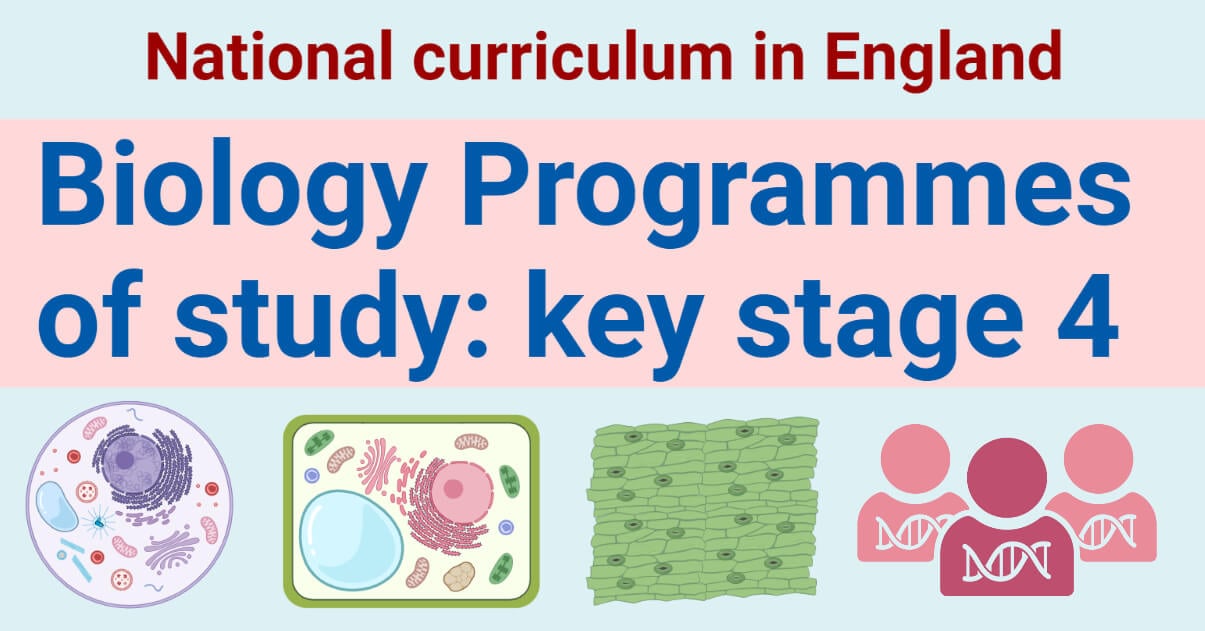Biology is the science of living organisms (including animals, plants, fungi, and microorganisms) and their interactions with each other and the environment. The study of biology involves collecting and interpreting information about the natural world to identify patterns and relate possible causes and effects. Biology is used to help humans improve their own lives and to understand the world around them.
Students should be helped to understand how, through the ideas of biology, the complex and diverse phenomena of the natural world can be described in terms of a number of key ideas which are of universal application and which can be illustrated in the separate topics set out below.
These ideas include:
- life processes depend on molecules whose structure is related to their function
- the fundamental units of living organisms are cells, which may be part of highly adapted structures, including tissues, organs, and organ systems, enabling life processes to be performed more effectively
- living organisms may form populations of single species, communities of many species and ecosystems, interacting with each other, with the environment, and with humans in many different ways
- living organisms are interdependent and show adaptations to their environment
- life on Earth is dependent on photosynthesis, in which green plants and algae trap light from the Sun to fix carbon dioxide and combine it with hydrogen from water to make organic compounds and oxygen
- organic compounds are used as fuels in cellular respiration to allow the other chemical reactions necessary for life
- the chemicals in ecosystems are continually cycling through the natural world
- the characteristics of a living organism are influenced by its genome and its interaction with the environment
- evolution occurs by the process of natural selection and accounts both for biodiversity and how organisms are all related to varying degrees.

Students should be taught about the following:
Interesting Science Videos
Cell Biology
- cells as the basic structural unit of all organisms; adaptations of cells related to their functions; the main sub-cellular structures of eukaryotic and prokaryotic cells
- stem cells in animals and meristems in plants
- enzymes
- factors affecting the rate of enzymatic reactions
- the importance of cellular respiration; the processes of aerobic and anaerobic respiration
- carbohydrates, proteins, nucleic acids, and lipids as key biological molecules
Transport systems
- the need for transport systems in multicellular organisms, including plants
- the relationship between the structure and functions of the human circulatory system.
Health, disease, and the development of medicines
- the relationship between health and disease
- communicable diseases, including sexually transmitted infections in humans (including HIV/AIDs)
- non-communicable diseases
- bacteria, viruses, and fungi as pathogens in animals and plants
- body defenses against pathogens and the role of the immune system against disease
- reducing and preventing the spread of infectious diseases in animals and plants
- the process of discovery and development of new medicines
- the impact of lifestyle factors on the incidence of non-communicable diseases.
Coordination and Control
- principles of nervous coordination and control in humans
- the relationship between the structure and function of the human nervous system
- the relationship between structure and function in a reflex arc
- principles of hormonal coordination and control in humans
- hormones in human reproduction, hormonal and non-hormonal methods of contraception
- homeostasis
Photosynthesis
- photosynthesis as the key process for food production and, therefore biomass for life
- the process of photosynthesis
- factors affecting the rate of photosynthesis.
Ecosystems
- levels of organization within an ecosystem
- some abiotic and biotic factors which affect communities; the importance of interactions between organisms in a community
- how materials cycle through abiotic and biotic components of ecosystems
- the role of microorganisms (decomposers) in the cycling of materials through an ecosystem
- organisms are interdependent and are adapted to their environment
- the importance of biodiversity
- methods of identifying species and measuring the distribution, frequency, and abundance of species within a habitat
- positive and negative human interactions with ecosystems.
Evolution, inheritance, and variation
- the genome as the entire genetic material of an organism
- how the genome, and its interaction with the environment, influence the development of the phenotype of an organism
- the potential impact of Genomics on medicine
- most phenotypic features being the result of multiple, rather than single, genes
- single gene inheritance and single gene crosses with dominant and recessive phenotypes
- sex determination in humans
- genetic variation in populations of a species
- the process of natural selection leading to evolution
- the evidence for evolution
- developments in biology affecting classification
- the importance of selective breeding of plants and animals in agriculture
- the uses of modern biotechnology including gene technology; some of the practical and ethical considerations of modern biotechnology.
Disclaimer: The syllabus and contents on this page are only used for educational purposes. If there are any copyright issues regarding the content, please email us at microbenotes@gmail.com.
References
National Curriculum for England, Department for Education, UK
